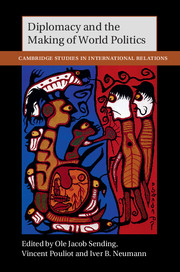Book contents
- Frontmatter
- Contents
- Contributors
- Acknowledgments
- Introduction
- Part I Making of international institutions
- Part II Making international cooperation
- Part III Diplomacy as a contested terrain
- Conclusion: Relationalism or why diplomats find international relations theory strange
- Bibliography
- Index
- Cambridge Studies in International Relations
Conclusion: Relationalism or why diplomats find international relations theory strange
Published online by Cambridge University Press: 05 September 2015
- Frontmatter
- Contents
- Contributors
- Acknowledgments
- Introduction
- Part I Making of international institutions
- Part II Making international cooperation
- Part III Diplomacy as a contested terrain
- Conclusion: Relationalism or why diplomats find international relations theory strange
- Bibliography
- Index
- Cambridge Studies in International Relations
Summary
Introduction
Diplomats often find international relations (IR) books strange. If they read – or more likely reread (as many Western diplomats have studied IR theory at some point of their life) – Waltz's Theory of International Politics, they shake their heads. When presented with metaphors of the state such as Wolfers's famous billiard ball: “a closed, impermeable, and sovereign unit, completely separated from all other states,” they look bewildered. Also non-realist IR scholarship appears odd to most diplomats. Finnemore and Sikkink's life cycle of norms would seem as far from their daily work tasks as Jervis's game theoretical models of cooperation and conflict under anarchy. Diplomats would anytime prefer the gossip in their embassy cables and the Financial Times (FT) to the models in International Organization or International Studies Quarterly. Not just because cables and FT provide a lighter read but also because they seem closer to what diplomats perceive as the “real world.” What lies behind this estrangement between diplomats and scholars of international relations?
Scholars in diplomatic studies have argued that the reason for the estrangement is to be found within IR theory itself. It is “dangerously reductionist,” “rationalistic,” focusing on macro decisions of superpowers, or simply irrelevant – “locked within the circle of esoteric scholarly discussion” as US diplomat David D. Newson put it. Arguably, IR theory has failed to acknowledge the logic of practice in diplomacy, and it does not capture the bodily experience to being a diplomat. However, the authors of the preceding chapters have demonstrated that the problem is more fundamental: IR scholars have ignored that diplomacy helps constitute world politics. To bring out the ways in which this constitution takes place, this book has employed a relational approach.
In this conclusion, which reflects critically on this approach and its wider consequences, I argue that diplomats are estranged from IR theory – and vice versa – because IR scholars generally subscribe to substantialism, whereas diplomats tend to think in terms of relations. In fact, a deeper understanding of these relations is a key theoretical take-away point of this book. More specifically, this conclusion argues that relationalism – as a meta-theoretical approach – not only helps us understand the diplomatic production of world politics, relationalism also reflects a particular ontology, which differs fundamentally from the worldview that most IR scholars subscribe to.
- Type
- Chapter
- Information
- Diplomacy and the Making of World Politics , pp. 284 - 308Publisher: Cambridge University PressPrint publication year: 2015
- 34
- Cited by



